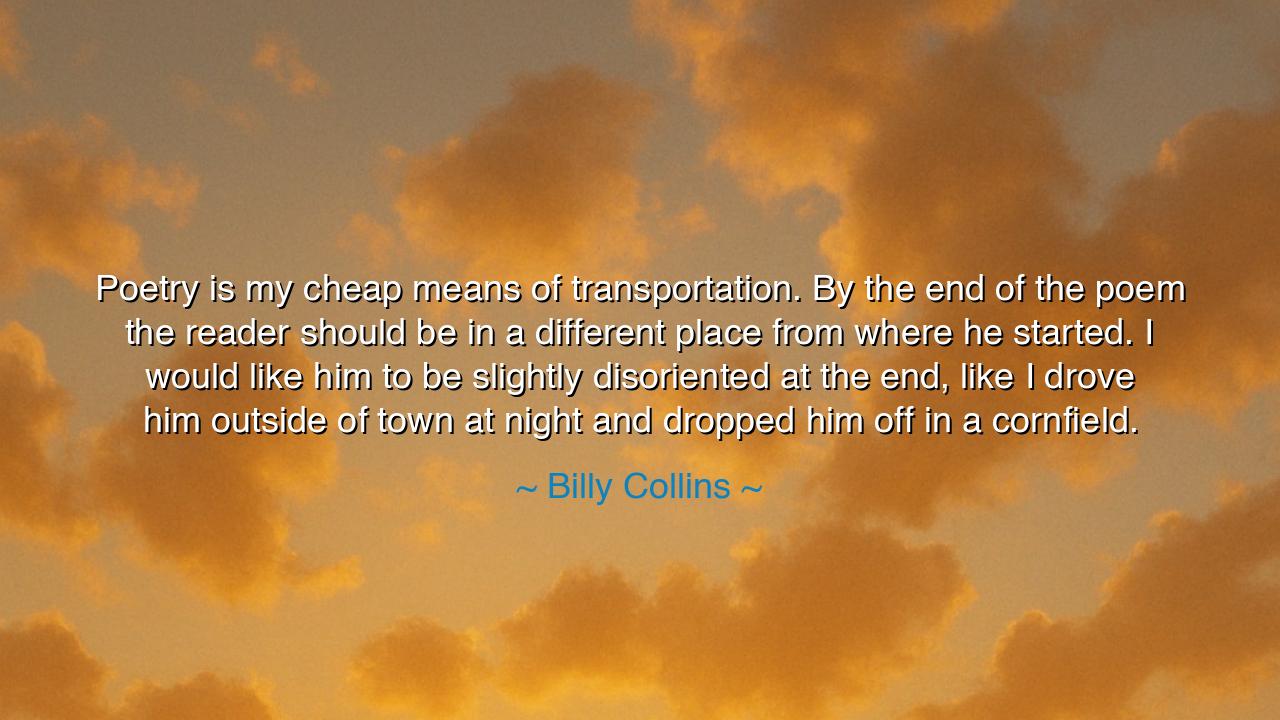
Poetry is my cheap means of transportation. By the end of the
Poetry is my cheap means of transportation. By the end of the poem the reader should be in a different place from where he started. I would like him to be slightly disoriented at the end, like I drove him outside of town at night and dropped him off in a cornfield.






Hear, O lovers of the word, the voice of Billy Collins, who declared: “Poetry is my cheap means of transportation. By the end of the poem the reader should be in a different place from where he started. I would like him to be slightly disoriented at the end, like I drove him outside of town at night and dropped him off in a cornfield.” This is not the playful jest it first appears to be, but a revelation of the true power of poetry: it is a journey, a departure from the familiar, a vehicle that carries us into strange landscapes of thought and feeling.
For what is poetry if not a vessel of the imagination, a chariot that lifts us from the dust of daily life and deposits us, bewildered but awakened, in another world? The poet is both driver and guide, steering us with images, rhythms, and turns of phrase. Yet unlike a sermon or a map, the poem does not tell us exactly where we will arrive. Instead, it seeks to surprise, to leave us standing in the field of mystery, compelled to look around, to reorient ourselves. Collins’s metaphor of the nighttime cornfield is perfect: the reader steps out of the poem into a place both unsettling and wondrous, where old bearings no longer hold, and new perspectives must be found.
This is not a new understanding, but an ancient one. The rhapsodes of Greece, who recited the verses of Homer, transported their listeners into the battles of Troy and the wanderings of Odysseus. When the tale ended, the people returned to their villages, but their minds were changed, their hearts altered, their vision widened. So too the prophets of Israel: Isaiah or Jeremiah did not simply state truths; they clothed them in poetry that carried hearers to the very throne of heaven or to the depths of despair. By the time their words were done, men were no longer where they began. Poetry, then, has always been the most subtle and enduring transportation.
Consider also T.S. Eliot, who in The Waste Land took his readers from the fragments of modern despair into echoes of ancient myth. His readers, bewildered, found themselves as if dropped into a cornfield of symbols and broken voices, forced to wander and to search. The disorientation was deliberate; it forced the mind to abandon easy certainties and to wrestle with deeper truths. Collins inherits this ancient role but expresses it with humor, showing that the destination of a poem is not comfort, but transformation.
Yet why must the reader be disoriented? Because disorientation awakens the soul. When we are lost, we begin to see. The familiar blinds us; the unfamiliar opens our eyes. Just as a traveler learns more when stranded in a foreign place than when walking a familiar road, so the reader of poetry learns more when the ground shifts beneath him. The cornfield at night is a symbol of that sacred bewilderment that forces us to look inward, to seek new meaning, to rediscover our bearings in the dark.
And here lies the deeper truth: poetry is not escape, but return. It carries us away only so that we may come back changed. The reader who finishes a poem is not the same as the one who began it. He may not even fully understand what has happened—but he senses the shift, the opening, the disturbance in the heart. This is the true transportation Collins speaks of: not merely movement in space, but movement of the soul.
Therefore, O seekers, the lesson is clear. Do not read poetry as though it were an ornament or pastime. Read it as a journey. Allow it to carry you, even when it leads into unfamiliar fields. Do not resist the disorientation; embrace it, for it is the sign that you have been moved. And if you write, do not be content merely to charm—lead your reader somewhere new, and do not fear to leave him astonished, bewildered, even trembling in the dark. For it is there, in the mystery, that transformation takes root.
So remember Collins’s wisdom: poetry is a vehicle, a means of transportation, and its destination is always beyond the familiar horizon. Step into the poem as into a carriage at dusk, and let it take you where it will. You will emerge changed, even if only slightly, standing in the field of wonder, the night wind upon your face. This is the true journey of poetry: to disorient us, that we may awaken.






AAdministratorAdministrator
Welcome, honored guests. Please leave a comment, we will respond soon